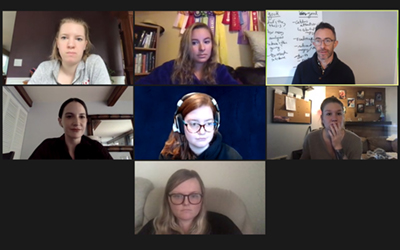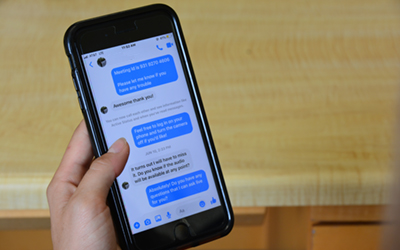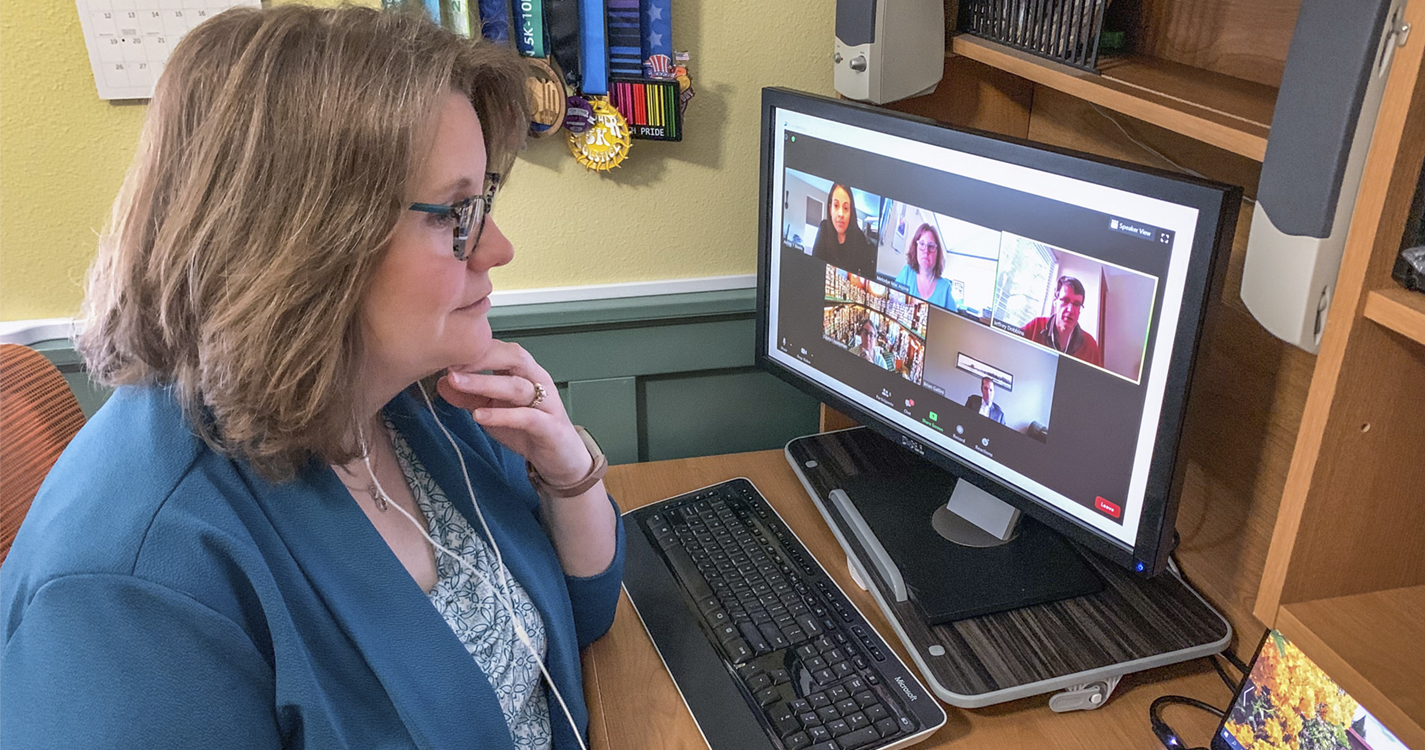Early in the year, when Willamette University administration realized the global COVID-19 pandemic was on its way to Oregon, representatives from each school began meeting frequently. As the designated law school attendee, Melodye MacAlpine, associate dean for student affairs and administration, took on a challenging role.
“Melodye was a hero for this. She was just outstanding,” says former Willamette Law Dean Curtis Bridgeman. “She quickly became our go-to person, working with everybody at the university. They had a team meeting at least once a day, one group twice a day. She was the main conduit for getting information back to us about the university-coordinated response.”
Willamette Law prides itself on providing students with an individualized law school experience. When the university realized it may have to switch to remote learning midway through the spring semester, MacAlpine knew it would be difficult.
The beginning of March had already been tough and emotional with the sudden loss of Professor Ed Harri JD’73. As the pandemic began spreading throughout the United States, MacAlpine and other administration began hearing from students. Some worried about catching the virus and about the unknowns, while others no longer felt comfortable coming to class.
Those on the university task force discussed question after question. What about final exams? What would students do if they didn’t own computers or have access to wi-fi? Were faculty prepared to teach online, and what platform would be best? How could students study with children and spouses at home and alternative study areas closed?
When a decision was made to go fully remote, it was quick, MacAlpine says. On March 16, all Willamette courses went online. With just over a month left in their final semester, graduating 3Ls said their goodbyes to the Truman Wesley Collins Legal Center. Eventually, their commencement ceremony was called off and postponed, and their Oregon bar exam was reorganized, then mainly canceled in late June to give graduates “diploma privilege” to practice without taking the test.
Professor Amy Meyers, director of bar preparation, says students faced multiple emotional and financial challenges due to the virus and civil rights protests happening over the summer.
“Our graduates are resilient, but this has been emotionally taxing on them,” Meyers says. “Students were conflicted about wanting to study, wanting to protest or advocate, wanting to protect their health and all kinds of distractions that should not be underestimated.”
She says they’re competent and well-prepared to practice law and pass the exam, but knew they were facing more noise than usual in their personal lives, making it difficult to focus on bar studies. Bridgeman says the faculty worked hard to continue connecting with students in each class, mastering Zoom and other technology quickly. As dean, he read student evaluations every semester and was especially interested to hear how faculty were rated in the spring.
He was pleasantly surprised to hear how little online learning was mentioned, except when professors were praised for innovative classroom strategies.
“The professors were outstanding, and the staff was really great in making a smooth transition,” Bridgeman says. “If you had told me a few months ago that we were going to have to transition in a week’s time to completely remote teaching, I would not have been optimistic.”
 In the midst of the tumultuous spring, he was also busy winding down his time in administration and anticipating a return to the faculty. Incoming Dean Brian Gallini made his way to Salem early when his own school went fully remote.
In the midst of the tumultuous spring, he was also busy winding down his time in administration and anticipating a return to the faculty. Incoming Dean Brian Gallini made his way to Salem early when his own school went fully remote.
Although not officially on staff, he began working early to learn and help prepare for the prospect of a disruptive fall semester. He conducted a series of listening forums with faculty and staff, trying to understand concerns and determine how to shape plans for the fall. He and the deans have worked to survey the entire student body regarding their comfort level in returning to in-person learning and listen to student preferences.
 Impressed with the flexibility of all groups, Gallini says he’s focusing on “nimble stability” and creating a culture of “shared ownership” for the 2020-21 academic year.
Impressed with the flexibility of all groups, Gallini says he’s focusing on “nimble stability” and creating a culture of “shared ownership” for the 2020-21 academic year.
“The idea is to provide enough stability so our community has confidence in our direction,” he says, “but ‘nimble’ because we don’t have control of what’s on the horizon.”
He and Dean MacAlpine say there will be a “three lane approach” to the school year. In the first lane, the law school will be open and social distancing and masking will be required. Students will have the option to take their classes online, in-person or in a hybrid combination of both.
The second lane contemplates the high likelihood that the school will need to go fully remote at some point, for some period of time, during the fall semester. In the second lane, all classes will be taught remotely, but the building will remain open as a quiet study space.
The third lane involves going fully remote, with minimal staff in the building and no access to students.
“Given the work our faculty have put in this summer to improve the remote teaching experience for our students, we are confident that we’re ready to support our students in the fully remote space,” Gallini says.
With health guidelines changing constantly, the College of Law deans turned over every stone and asked every question they could think of.
Because no one had experienced a pandemic before, Gallini says they embraced the lack of precedent and developed a positive momentum. As the fall approached, the deans' focus was clear.
“We recognize that a lot of the strength of the university is our ability to connect with students and create that individualized experience,” MacAlpine says. “As we think about the fall, we are trying to prioritize that as much as possible, balancing health, safety and state guidelines. Our university personnel are working extremely closely to make sure we are aware of guidelines and planning accordingly.”
Re-opening and Instruction Plans for 2020/21
View the plans from the College of Law to reopen for the coming academic year (pdf) in accordance with public health guidelines.
About the Willamette University College of Law
Willamette University College of Law was the first law school to open in the Pacific Northwest. Building on deep historic roots, we focus with pride on educating the next generation of problem-solving lawyers and leaders. Our location in Salem, Oregon, directly across the street from the Oregon State Capitol and Supreme Court, cannot be matched in the region. Our thought-leading scholars advance and promote our shared responsibility to make a difference in society, placing justice, fairness, and equality at the heart of everything we do.
The College of Law produces the best problem solvers, community leaders, legal dealmakers, and changemakers in the most innovative region of the country. We have had several years of remarkable growth in academic achievement, as our bar passage rates and employment outcomes reflect. We also consistently have the highest graduate employment rates among all Oregon law schools, and are among the best on the entire West Coast.
We are a dynamic force within our university’s vision of an “Only at Willamette” education and have worked to develop one of the most forward-thinking and creative legal education programs in the country. Our student-centric approach manifests in the robust experiential learning opportunities we provide alongside curricular strengths in public service, business law, advocacy, international law, and health law.

